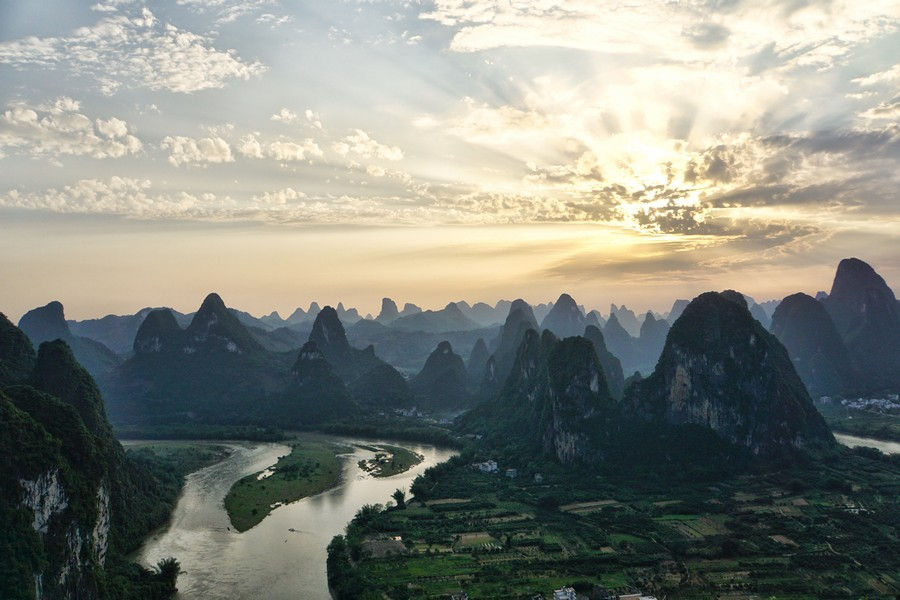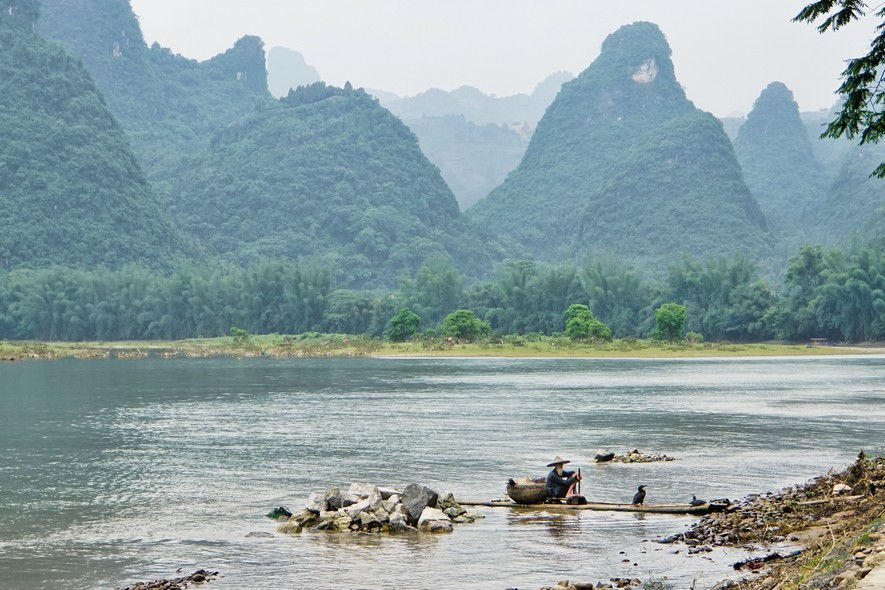SPECTACULAR PEAKS BY THE LI RIVER: GUILIN AND XINPING
GUILIN
After Fenghuang, our last stop in the Hunan province, we took a 6-7-hour direct bus to Guilin, the capital of Guanxi. Already the way was very picturesque with hilly landscapes, rice fields and locals working on the fields with water buffalos, often walking in water up to their ankles. We were happy to arrive to Guilin finally after the long drive and way too much biscuits with no chance to get any proper food. Locals seem to be happy with a pot of powder noodle soup for lunch, but although we consider ourselves adventurous in terms of food, there are some minimum standards of healthy-ness we try to hit on the way too. Once in Guilin, we realised that we were taken to a different station within the city than what we expected, but we aren’t even surprised by these tiny inconveniences anymore! We headed straight to our hostel, probably the most popular one in the city for foreign backpackers, called This Old Place, close to one of the four lakes of the city. It was a delight to find a helpful, English-speaking staff in the hostel who could help us organise our trips to our next destinations, as Guilin is a starting base for many travellers these days. It used to be the first place where Chinese tourism started booming a few decades ago, and by today it has grown into one of those large cities with a population of 5 million, packed with hotels and herds of tourists that has lost its authentic feel. It still offers a nice natural landscape of karst mountains though and mass-packaged boat trips along the Li River to see these mountains.
The city has a very different atmosphere from the places we touched earlier in China. For the first time since Shanghai and Beijing we met many foreigners. The extreme touristy-ness is also why surprisingly many vendors were also able to speak at least a few words in English (at least in the city centre). There is a nicely organised promenade on the lakeshore with plants and elegant lights at night. In the evening the parks were busy with groups dancing and practicing tai chi. It might be just personal experience, but people seemed to be nicer and more helpful here, at one occasion after bumping into us by accident the person even apologised.
In the evening we walked around the centre and visited the night street-food market for dinner with great selection, very low prices and long queues at the best corners. In Guilin visitors need to try the Guilin-style rice noodle, so this is what we did in the market, for £1 each for a dish! Variations exist with cold or hot noodles, meat or vegetables only, and in many cases they pour some liquid on top which tastes similar to vinegar. Fresh fruit smoothies are also offered in every 5 meters, which we were missing since Colombia! Szilveszter also tried some local favourites such as freshly cooked garlic oysters and grilled octopus on a stick.
XINPING
After Longsi we had to go back to Guilin first and then continue further South for another 2.5 hours to Xinping. This area, similarly to Guilin and Yangshuo, is famous for the Li river scenery and the hundreds of karst mountains that hug it from both sides, over many kilometres. It’s a fascinating landscape which is part of the UNESCO World Heritage. As the famous sections of the river around Guilin and Yangshuo are packed with local and foreign tourists, we decided for Xinping instead, a smaller town on the river, which resembles to the Yangshuo of 15 years ago.
View from the peak over Xinping - a must do hike!

We spent a good few days relaxing and discovering the views by foot, boat and bicycle, the activities that are most common in the area. On our trips we passed by tiny villages (most of them had many newly built houses and even more in construction, which shows what is expected to happen to this area soon too), rice fields and orange plantations, the most typical fruit in the area. We loved having freshly squeezed orange juice coming from the village, although a good few times locals try to take advantage of our non-existent Chinese language skills. At one occasion one bottle cost 5 yuan, so when we asked for two, we were asked 15 yuan! It took us some negotiation to “get the price down” to 10 yuan. Funnily enough prices differed each time we went back, even with the same vendor or shop!
Cycling and biking among orange plantations
It's still possible to encounter fishermen who practice the traditional cormorant fishing on the river: the bird catches the fish but is unable to swallow larger ones due to a snare on its throat, only smaller ones. When a cormorant has caught a fish in its throat, the fisherman brings the bird back to the boat and has the bird spit the fish up. Though cormorant fishing once was a successful industry in Japan, China and Korea since around 960 DC, its primary use today is to serve the tourism industry.

Close to the pier in Xinping is the river view that is pictured on the back of the 20 yen note,, which brings many visitors to the town.

A visit to the local market was one of the highlights of our trip, a really authentic experience! It was a lovely hub of food vendors, hairdressers, vegetables and fruits, and we got to see some of the everyday moments of the local people. We also tried some dumplings at the market for literally peanuts, and no, we did not get sick, With the huge turnover on the market everything was absolutely fresh.
We also couldn’t miss the famous light show in Yangshuo, which is a performance directed by the same person who organised the Beijing Olympics opening and closing ceremonies. It is set on the river with the karst mountains around, which is said to be the biggest natural stage in the world, attracting locals from all across China. There is a show twice a day, and each time 3000 seats are filled! As we were eager to go (well, mostly me), we had to get a few more people from the hostel to share the cost of an organised minivan, the only viable option from Xinping. It wasn’t an easy task, as the tickets were quite pricey, especially by Chinese standards, and were above the budget of the average young backpackers. In the end, with the right targeting of our sales pitch, we found a Russian couple, who couldn’t speak much English, but I managed to explain to them what we wanted with pictures, which convinced them to join us! An English girl, who we first met on the rice fields and then got bumped into again in Xinping, also bought in to the show. With the 5 of us we had a good time at the performance, although we found it very different from what we were used to. We couldn’t catch the storyline, but it must have been something related to the traditional rural way of local people. There were live animals in the show, like water buffalos, cows, cormorants (the bird local fishermen use to fish with), children and women in folk costumes singing, and many boatmen on the river which made a spectacular scene.
Probably the most surprising of all for us was the spectators: people talked loudly through the whole performance, took pictures by lifting up their phones (and hiding the view for the people behind them), made recordings which they played back to their neighbour with full volume, and then half an hour before the end started leaving (of course by standing up in front of the rows behind them and slowly walking out). By the end of the show the audience area was almost completely empty, funnily the people still sitting were mostly foreigners, and we just looked at each other by surprise where had all the others disappeared! Overall, it was a show designed for local tastes with some creative elements, but we felt the location had a lot more potential which wasn’t fully used.
Although first hesitated, finally we also tried the “bamboo” rafting in Xinping, which is a boat trip up on the river on a boat made out of plastic shaped like bamboo. As this was the only way of transport to see the river, we had no other choice. The overall experience, unfortunately, proved that we were a few years too late visiting Xinping, as the river is overcrowded with tourist boats completely taking away its authentic feel.
On top, some tourist traps are already built into the journey: we made an unexpected stop at a section of the river bank where some rather aggressive vendors practically attacked the boat to sell their products and to give us their cormorants and hats to take pictures of us for some money. During this stop, we met some unfortunate passengers whose driver jumped to another raft and disappeared leaving them behind, desperately trying to negotiate (without speaking Chinese of course) for someone able to take them back to the port. Luckily, our experiences didn’t reach this extreme level!
After 4 days relaxing in Xinping we were ready to get back to our starting point, Guilin (where with special internet connection we had access to Google, Gmail and Facebook!), and take the train to Hong Kong, our last stop before Vietnam.

































